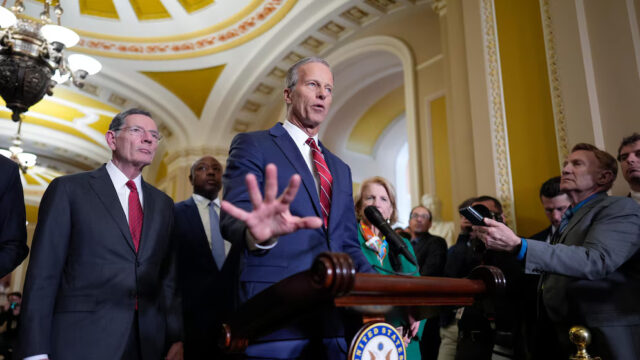
Senate Republicans have introduced a sweeping budget proposal aimed at extending major tax cuts while also increasing the national debt limit by a staggering $5 trillion. This move is set to reshape the economic landscape by continuing the policies first introduced under President Trump’s 2017 tax reforms and introducing additional cuts that could impact both businesses and individuals.
Key Provisions of the Budget Plan
The Republican budget plan includes two major financial adjustments:
- Extending the 2017 Tax Cuts – A significant portion of the proposal involves a $4 trillion extension of the tax cuts originally passed under the 2017 Tax Cuts and Jobs Act (TCJA). These tax breaks, which were set to expire in 2025, primarily benefited corporations and high-income individuals, while also providing some relief for middle-class taxpayers.
- New Tax Cuts Worth $1.5 Trillion – On top of extending previous tax reductions, the proposal introduces $1.5 trillion in new tax cuts, aimed at stimulating economic growth and investment. While details are still emerging, these cuts may include further reductions in corporate taxes, capital gains taxes, and potential incentives for small businesses.
- Raising the Debt Limit by $5 Trillion – To accommodate these tax reductions without immediate budget cuts, the plan proposes an increase in the national debt ceiling by $5 trillion. This move is expected to spark heated debates over fiscal responsibility, as the U.S. debt already surpasses $34 trillion.
Political Strategy: The Reconciliation Process
With a 53-47 Republican majority in the Senate, GOP lawmakers have the ability to push this budget through using a legislative tool known as budget reconciliation. This process allows the Senate to pass certain budget-related bills with a simple majority, bypassing the usual 60-vote filibuster threshold that would require bipartisan support.
By leveraging reconciliation, Senate Republicans could approve the tax cuts and debt increase without needing Democratic votes, setting the stage for a major legislative battle.
Economic and Political Reactions
Support from Republicans
Republicans argue that extending and expanding tax cuts will:
✅ Boost economic growth by giving businesses more capital to invest.
✅ Create jobs by reducing corporate tax burdens.
✅ Provide relief for families by preventing tax hikes on middle-class Americans.
Senator Rick Scott (R-FL) defended the proposal, stating, “American businesses and workers need certainty, and these tax cuts have proven to fuel our economy. Raising the debt ceiling ensures we don’t hit a crisis while growing the economy.”
Criticism from Democrats
Democrats, on the other hand, strongly oppose the plan, citing concerns over rising deficits and income inequality. They argue that:
❌ The tax cuts disproportionately benefit the wealthy and corporations.
❌ Raising the debt limit by $5 trillion without offsetting spending cuts is fiscally irresponsible.
❌ The reconciliation process bypasses bipartisan discussion, making it a one-party decision.
Senator Elizabeth Warren (D-MA) warned, “This reckless plan hands trillions to the rich while driving up our debt. Working families will ultimately pay the price.”
What’s Next?
The budget proposal is expected to trigger intense debates in the Senate and beyond. If Republicans proceed with reconciliation, they could pass the measure without Democratic support, though internal GOP divisions may still pose challenges.
With the 2026 midterm elections approaching, this tax-and-debt battle is likely to become a major campaign issue. Will Republicans succeed in cementing these tax cuts? Or will opposition force changes to their proposal?



